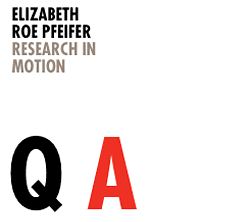Sponsors
Elizabeth Roe Pfeifer is the Vice President of Human Resources at Research In Motion (RIM), makers of the BlackBerry smartphone. She built the HR organization from the ground up, and continues to focus on providing international support to all business units at RIM (which was Fortune’s fastest-growing company in the world in 2009). Pfeifer’s goal is to continue to support the entrepreneurial, innovative workplace where employees have the opportunity to be creative and independent.

- Innovation is key to the culture at RIM. How do you help your people balance the drive to do better, faster, with the need to balance their lives?
- Innovation is key to the culture at RIM, as is an entrepreneurial spirit. These elements of our culture often attract passionate individuals who bring enthusiasm to their roles. To help these talented individuals continue to operate at what is often referred to as “RIM Speed,” my leadership team and I have taken a focus on simplicity: encouraging uncomplicated, solution-oriented collaboration. This collaborative environment has fostered better service from HR to the business, and continues to provide a better hands-on sense of how teams are interacting, so they can be more proactive if there are issues, and leverage successes. We have even taken it one step further to create an HR model that has our functions sitting in the business, rather than providing support from a distance. These combinations of items that make up the culture and work environment have continued to help employees be more effective in their roles, thus creating better balance in their lives.
- What are some of your goals when you’re helping a woman develop her career at RIM? Can you talk about some hiring initiatives at RIM that focus on women?
- As a woman in a leadership role at a pay-for-performance company, I am proud of the steps RIM has taken to support women. With the average age of employee at RIM being 34, we are overall a fairly young company. This has meant that we often have many maternity leaves within a year. While we stick to country guidelines, RIM supports the need for balance that parents have, not just mothers. We have several programs that support a work-life balance, including child-care programs with extended hours, backup and emergency child care. With a strong representation of women in leadership roles, I would say the largest initiative is attracting and developing candidates and employees based on their qualifications and performance and nothing more.
- In an interview, you’ve talked about the entrepreneurial, self-directed quality that’s common to people who succeed at RIM. Are there some tools that you use to help new hires develop that muscle?
- I often talk about the need to hit the ground running right from day one at RIM. To support the entrepreneurial spirit and self-directed quality, we have adapted a few tools employees can leverage when they start. This includes a full-day orientation on every employee’s first day of employment, which provides some important groundwork to help a successful start to their career at RIM. We have also continued to support the establishing of networks of professionals within RIM, and cross-functional collaboration that brings a variety of expertise to areas that traditionally relied on the talent from one group exclusively. Job shadowing and stretch assignments are also frequent at RIM, allowing individuals to get a feel for another role or develop a skill set that may not be used in their current role. Internal mobility and promotion have been extremely effective as well in keeping people motivated and self-driven. The growth and success of the company has likely been our best tool, especially in the past three to four years, the opportunities to try something new, retain happy employees, and find new ways to support the need for a convergence of skill sets to support future workforce planning.
- You’re also recruiting a lot of employees who are newly out of school. What is this new generation of graduates looking for in a workplace? What has surprised you about what they ask for?
- The new generation is certainly different than previous graduate classes, and you’re correct, our campus program provides students varying co-op placement opportunities from 4- to 16-month terms. After these co-op assignments, many students have had the desire to continue working at RIM. This new generation is looking for challenges, ownership and development, and all in a short timeframe. They are also looking for opportunities to stay connected with their colleagues, so finding new ways to help employees do so has become more important. I have been pleasantly surprised and most excited about the motivation and ambition that our new graduates bring to our organization. They want to be leaders. They want to be challenged and gain new experiences quickly. We strive to set them up for success by providing career direction in order to help them achieve their professional goals.

